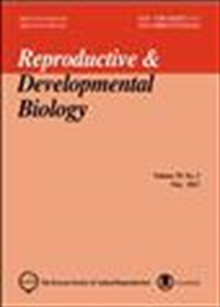간행물
Reproductive & developmental biology

- 발행기관 한국동물번식학회
- 자료유형 학술지
- 간기 계간
- ISSN 1738-2432 (Print)2288-0151 (Online)
- 수록기간 1977 ~ 2018
- 주제분류 농수해양 > 축산학 농수해양 분류의 다른 간행물
- 십진분류KDC 527DDC 636
권호리스트/논문검색
Volume 41 No 4 (2017년 12월) 1건
1.
2017.12
구독 인증기관 무료, 개인회원 유료
Alpha-linolenic acid (ALA) is one of n-3 polyunsaturated fatty acids and found mainly in the chloroplasts. Many studies have been reported that intracellular reactive oxygen species (ROS) in mammalian oocytes were reduced by supplementation of ALA in in vitro maturation (IVM) medium. Based on these reports, we expected that ALA acts as an antioxidant during IVM of porcine oocytes. Therefore, the objective of this study was to investigate the antioxidant effect of ALA supplementation during IVM in porcine oocytes. The cumulus-oocyte complexes (COCs) were incubated in IVM medium containing 200 μM H2O2 or H2O2 with 50 μM ALA for 44 h. Nuclear maturation stage of oocytes was evaluated using aceto-orcein method. For measurement of oxidative stress state, intracellular ROS and glutathione (GSH) levels were measured using carboxy-DCFDA and cell tracker red, respectively. In results, oocytes in metaphase-II (MII) stage development was significantly reduced in H2O2 group compared to non-treated control group (61.84±1.42% and 80.00%, respectively; p<0.05) and it was slightly recovered by treatment of ALA (69.76±1.67%; p<0.05). The intracellular GSH levels was decreased in H2O2 groups compared with control groups, but it was enhanced by ALA treatment (p<0.05). On the contrary, H2O2 treatment increased intracellular ROS level in oocytes and H2O2-induced ROS was decreased by treatment of ALA (p<0.05). Our findings suggested that ALA treatment under oxidative stress condition improve oocyte maturation via elevated GSH and reduced ROS levels in oocytes. Therefore, these results suggest that ALA have an antioxidative ability and it could be used as antioxidant in in vitro production system of porcine embryo.
4,000원

